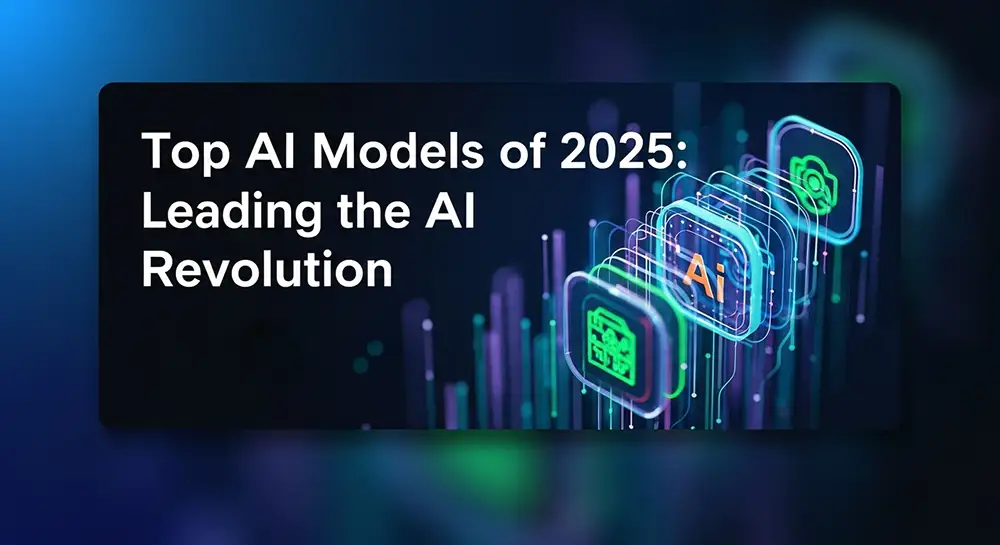
🚀 Top AI Models of 2025: Leading the AI Revolution
1. Gemma 3n (Google)
-
Type: Lightweight Multimodal Model (text, image, audio, video)
-
Standout Feature: Runs fully offline on edge devices with just 2 GB RAM
-
Why It Matters: Delivers advanced AI on smartphones and IoT gadgets—boosting privacy, speed, and accessibility
2. Claude 4 Family (Anthropic)
-
Models: Claude Opus 4 & Claude Sonnet 4
-
Key Strengths:
-
Opus 4: Extended reasoning—runs autonomously for hours, top-tier in coding and complex problem-solving
-
Sonnet 4: Lightweight but robust, with improved cloning of Sonnet 3.7
-
-
Why It Matters: Redefining reliability and trust in AI agents through powerful capabilities and advanced safety measures
3. Gemini 2.5 Pro (Google DeepMind)
-
Type: Multimodal LLM (text, code, audio, image) with 1M+ token context
-
Latest Update: Includes Deep Think, an enhanced reasoning mode for advanced math and coding
-
Why It Matters: Ideal for developers building long-form applications and multimodal workflows
4. GPT‑4.5 Orion & GPT‑5 (OpenAI)
-
GPT‑4.5 Orion: Final non-reasoning model in the series; still powerful for general use
-
GPT‑5 (coming soon): Expected features include 1M+ token memory, native audio, tool use, and persistent memory
-
Why It Matters: GPT‑5 promises to raise the bar in conversational AI and developer access to agentic capabilities
5. Gemini Robotics Model (Google DeepMind)
-
Type: Vision–Language–Action (VLA) model optimized for on-device robotics
-
Key Feature: Runs entirely offline on hardware, suited for fine motor tasks and autonomy
-
Why It Matters: Pioneering real-time, private AI in physical systems
6. DeepSeek-R1 (China)
-
Type: Multilingual Reasoning Model
-
Current Status: Widely used; R2 delayed due to hardware needs
-
Why It Matters: Offers strong reasoning capabilities at lower cost, pushing global AI competition
7. Baidu Ernie 5 (expected H2 2025)
-
Type: Multimodal Model (text, audio, image, video)
-
Why It Matters: Adds to China’s AI leadership, with multimodal scale and cloud deployment backing
8. Amazon Nova (Bedrock)
-
Type: Reasoning-Focused LLM
-
Launch Timeline: Expected June 2025
-
Why It Matters: Touts cost-efficiency and competitive reasoning performance, increasing choices for enterprise users
📊 Quick Comparison
| Model | Category | Strength |
|---|---|---|
| Gemma 3n | Edge Multimodal | Offline, lightweight AI |
| Claude Opus 4 | Lang/Reasoning AI | Long reasoning, autonomous tasks |
| Gemini 2.5 Pro | Multimodal LLM | Deep Think, code + multimodal |
| GPT‑5 | General Multimodal | Agentic, memory, audio support |
| Gemini Robotics | On-Device Robotics | Physical autonomy, low latency |
| DeepSeek-R1 | Cost-Effective LLM | Multilingual reasoning |
| Baidu Ernie 5 | Multimodal LLM | Chinese market & cloud support |
| Amazon Nova | Enterprise Reasoning | Budget-friendly and robust AI |
⚡ AI Trends in 2025
-
Edge AI everywhere: Models like Gemma 3n bring private AI to everyday devices.
-
Reasoning breakthroughs: Models like GPT‑5, Claude Opus 4, and Gemini Deep Think raise capabilities in logic, coding, and problem solving.
-
Robotics autonomy: AI is moving from digital to physical spaces with on-device reasoning for robots.
-
Global model competition: The landscape includes OpenAI, Google, Anthropic, DeepSeek, Baidu, and Amazon—each bringing unique regional and technical strengths.
✅ Final Thoughts
The AI model ecosystem in 2025 is a diverse field of specializations—from ultra-compact edge models to deep-thinking agents and autonomous robotics systems. Whether you’re a developer, business leader, or tech enthusiast, these are the models shaping the next generation of intelligent systems.